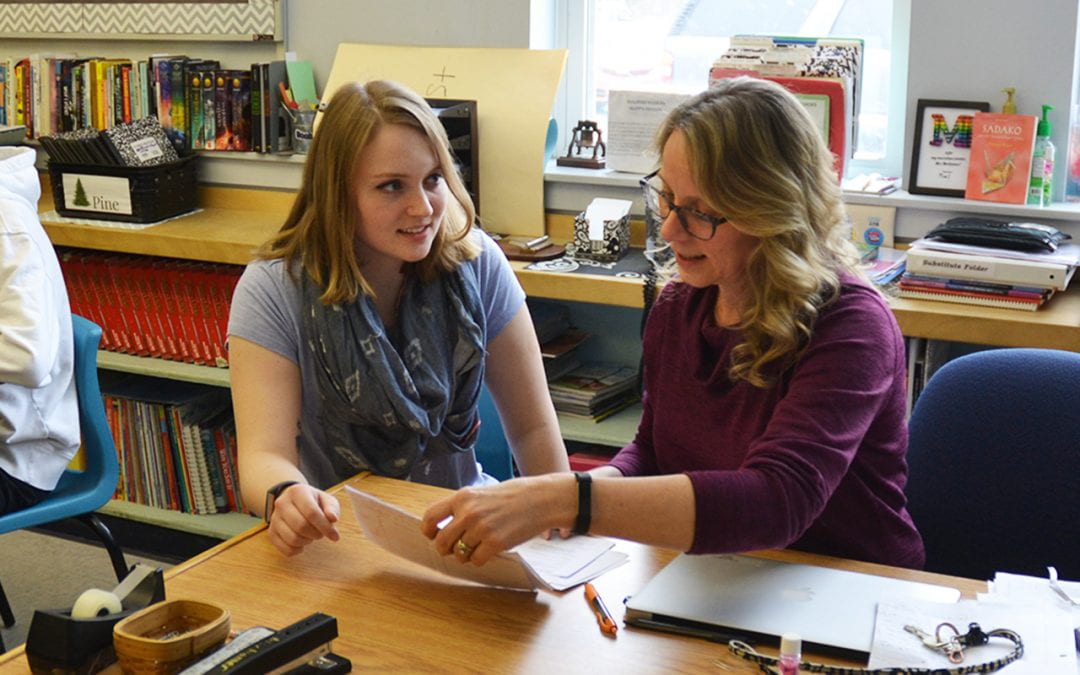
Apr 28, 2020 | Feature |
by April Mulherin, UMF Associate Director for Media Relations
This story was a press release by the UMF Media Relations Department.
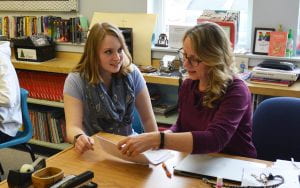
(Left to right) Maggie Pomerleau, UMF senior majoring in secondary education, as she worked in the classroom with Denise Mochamer, her mentor teacher from Mt. Blue Middle School, prior to remote learning directive due to COVID-19.
Photo Credit: UMF Image
FARMINGTON, ME (April 28, 2020)—University of Maine at Farmington graduating senior Maggie Pomerleau, from Sidney, was excited about student teaching and her spring semester at UMF. Things changed when in March, University of Maine System campuses and K-12 schools throughout the state transitioned all in-class instruction to remote learning, due to the COVID-19 outbreak.
With a major in Secondary Education, and a concentration in English, she was in the midst of fulfilling her student teaching requirement with Mt. Blue Middle School eighth-grade teacher Denise Mochamer, UMF class of 1989, and the 80 middle school students from four classrooms in the cohort.
Pomerleau felt very fortunate to have Mochamer as her mentor teacher and loved the kids.
“I was pretty stressed at the start, as I’m sure we all were,” said Pomerleau. “My time at Farmington has really prepared me for the teaching profession, and I didn’t want to miss my student teaching experience.”
Mochamer’s response to the situation was calm and supportive, according to Pomerleau. “Once we all caught our breath it was, “okay, how do we make this work for our kids?”
“We had to think outside the box,” said Pomerleau. “We are so fortunate that students in the Mt. Blue School District have laptops they can use and take home.
Mochamer transitioned classroom activities to Google Classroom, and office hours were set up with an online tool, three times a week, for students who needed extra help or just wanted to reach out. Also, Pomerleau has a weekly virtual meeting with her mentor teacher. Communication is key as Google Hangouts and email provide useful tools for staying in touch with students.
They still had to figure out how to help the students without internet at home, according to Pomerleau. She helped Mochamer create work packets the students could pick up when they picked up their daily meals provided by the district’s food service.
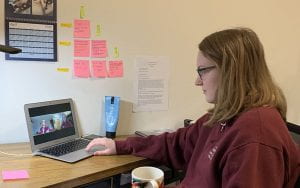
UMF student Maggie Pomerleau on one of her many virtual meetings with mentor teacher Denise Mochamer as they create virtual student teaching experience.
Photo Credit: UMF Image
“I have truly enjoyed working with Maggie this spring,” said Mochamer. “It didn’t go as originally planned, but we certainly have been creative and worked through this new learning. I wouldn’t have wanted to go through it with anyone else but her.”
For the unit on argumentative writing, Pomerleau created a lesson plan and was busy grading 80 essays, while also working on her digital portfolio and teacher work sample for the end of her school year.
“It’s been hard not being at the middle school during my last semester at UMF. I see my students missing their friends, spring sports and the end of the year activities, and I am going through the same thing,” said Pomerleau.
“It’s been a challenging experience, but one that has helped prepare me for the crucial and evolving role teachers fill every day.”
In addition to her studies, Pomerleau has served as the student representative for the University of Maine System Board of Trustees, vice president for the UMF Class of 2020, a member of the UMF Student Senate and an Admissions Ambassador.
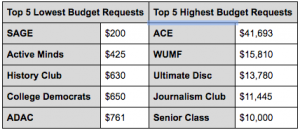
Apr 20, 2017 | News |
By Nick Bray, Staff Reporter
At a recent meeting of the UMF Student Senate general assembly, senators approved the budgets for 38 clubs and organizations for the 2017-2018 school year. The budget, which was set at $215,012.74, is appropriated from funds raised by the student activity fee. This fee is based on the number of credits a student takes, and ranges from $80 to $160 per year.
The approved budgets ranged from $200 for the Student Activists for Gender Equality (SAGE), to $41,693 for the Association for Campus Entertainment (ACE). The average budget approved was for $5,658; 25 clubs had a budget approved below the average. The top five highest budget requests totaled $92,728, which amounted to 43 percent of the entire budget approved.
This meeting was the final step in the annual budget process, which begins with clubs submitting a proposed budget to the senate for review. These clubs then meet with the Annual Budget Committee (ABC) to defend their budget and discuss where potential cuts could be made. According to Dominic Martorano, outgoing Officer for Financial Affairs (OFA), the ABC works with clubs during this meeting to make small cuts to their budgets. “Unfortunately, cuts do have to be made here and there,” Martorano said. “On average about 10 percent is cut from the original request.”
Clubs which were present at the general assembly budget meeting had an opportunity to defend their budget to senators before it was voted on. The budget meeting moved swiftly as senators had little discussion over the majority of proposals, and most club budgets passed unanimously.
However, there were discussions about cutting line items from proposals from three clubs. The senate discussed and eventually failed to pass a motion to cut a $200 trip to Portland from the French Club’s budget.
Another failed motion was to increase the number of athlete registration fees for the Ultimate Disc club from 25 to 30. A few senators argued this would benefit the club if they underestimated participation for the upcoming school year. This would save them from using one of their two additional budget requests if the number of players on the team next year exceeds 25.
The biggest discussion of the night was over the Computer Club’s budget, the only one which was cut during the budget meeting. The computer club requested two new desktop computers, at a cost of $1,300 each. Senators discussed whether they wanted to cut their request from two computers down to one.
The club currently has nine computers in use. Due to the high use of these machines and poor room conditions in their office located in the student center, they have two machines which are slowly becoming unusable for computer gaming. The new machines would also be used to support the growing interest in competitive gaming, more commonly known as eSports.
The computer club needed to upgrade its machines in order to meet the high system requirements of the games played in competition. “We would like the computers to support that, but these machines wouldn’t be used exclusively for that purpose,” said Desiree Anderson, treasurer of the Computer Club.
The senate passed a motion to reduce the budget request for two computer down to one. Senator Sam O’Neal, also the event coordinator for the Computer Club immediately indicated that the club would be appealing the decision and asked about the specifics of the appeal process.
Several student senate-funded clubs did not present budgets during the annual budget process. These clubs include Beta Beta Beta and Writers Guild. They will have the opportunity to present a budget in the fall. “This depends on availability of funding and the discretion of the new executive board,” Martorano said.

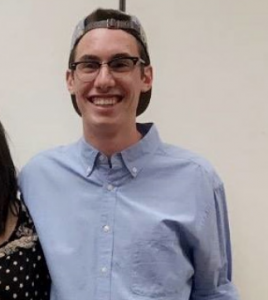
Apr 20, 2017 | Feature |

Newly elected Student Senate President for the upcoming 2017-2018 year. (Photo Courtesy of Facebook)
By Kaitlyn Polk, Contributing Writer
Student Senate recently elected a new president, Joseph Brichetto whom you may know for his many involvements around campus. You can find him in the basement of Scott Hall taking care of his residents, you can catch him on the green playing Ultimate Frisbee, hanging out in the Mainely Outdoors building, or making lesson plans for his secondary education classes. His laugh is infectious and he captures the UMF spirit.
Brichetto, the long-legged, ultimate frisbee player shows pride as he talks about why he decided to run for Student Senate President, “I want to be Senate President because I feel that I can be very effective in the role in terms of giving back to the UMF community,” said Brichetto. “Throughout my time here, I’ve strived to make UMF a place for students to fall in love with like I did and Student Senate President seemed like the next logical step.”
He became involved with student senate his sophomore year because he didn’t attend UMF his freshman year. He started at Orono right out of high school after graduating from Bangor High School. He didn’t want to venture out of his comfort zone. “Being a freshman and an undeclared major and a commuter, I naturally hated it,” said Brichetto. He traveled up to UMF one weekend to visit some friends from high school and he knew this was the school for him and he transferred.
Being the great friend that he is, Brichetto would proxy for all of his friends who couldn’t vote and this would occur on a regular basis. “So naturally when a seat opened up, I ran for the spot but ended up losing to OCA Jaramillo,” Brichetto said with a giggle continuing, “Thankfully, six seats on general assembly opened up that next semester and I was appointed to one of those.”
Now a junior, he has served as club commissioner this year and has a passion to do more for clubs. “There are just a few pragmatic changes that could be made which would jive better with how clubs run today,” said Brichetto, “I think would be beneficial for Senate and clubs alike.” He is a member of one of the club sports and really wants to make a difference.
Brichetto believes that leadership is a key to being a good president and while he exceeds in leadership being a Community Assistant in Scott Hall, he recently passed his exam to be a certified EMT and is always around when his residents need him.
Amanda Swart a resident of Brichetto’s hall said, “Joe is a great a CA and leader and always makes sure his residents feel welcome.”
Brichetto and vice president Stephen Riitano are lucky that they get to work together. Riitano and Brichetto both attended Bangor High School, are CAs, and even have the same major; secondary education.
Along with the rest of senate e-board, Brichetto showed excitement to start working with them. “I’m excited to work with all of my eboard,” Brichetto said. “I know them all well and understand their work ethic and problem-solving styles and believe theirs will be a high level of cohesion.”

Apr 20, 2017 | Feature |

Former Student Senate President Jamie Austin. (Photo by Emily MacCabe)
By Sofia Vanoli, Contributing Writer
Walking out of Olsen Student Center heading towards South Street, it is nearly impossible not to turn your head and catch a glimpse of the motion inside the Student Senate office, where a long table with usually two or three people around it are working on their computers or sharing ideas. That is where you can find Jamie Austin, the outgoing President of UMF Student Senate.
Austin is from Springvale, Maine, and a well-known face around campus who will charmingly say good morning with a wide smile. She is going through the final stages of completing her degree or how she put it, “surviving my spring semester of my senior year.”
Austin knew she wanted to come to Farmington when she was a freshman in high school, and she originally wanted to be a social studies teacher. However, there was a slight shift in her plans. “I took a political science class with Dr. Beck in my first semester and it kind of pulled me into that direction,” she said. In a few short weeks Austin is graduating with a degree in political science.
The Student Senate has always been part of her UMF experience. Her first and second year she was a senator and her third year she became Officer of Financial Affairs, a position she found to be very rewarding.
Austin recalls her experiences with student senate fondly. “I often tell people when I give tours, when I work in the Admissions Office, that I’m kind of majoring in Student Senate,” she said with a big smile.
Kristen Swan, Director of Student Leadership and Service and the faculty advisor to Student Senate, has had the opportunity to work with Austin throughout the senior’s tenure in the organization. Swan spoke highly of Austin and her accomplishments over the last four years.
“She was a student employee, a Special Projects Assistant, when I was the Director for the Center of Student Involvement where she really is to be credited with helping to bring structure to the club sports program,” Swan remembered in a very heartfelt email.
Sarah Carlson is a sophomore and a special education major, but also she is currently the chair of the Leadership Banquet and the incoming Secretary of Student Senate. She had the opportunity of working with Austin this past year and she used nothing but friendly words to talk about the senior. “Being the Leadership Banquet Chair, I had to work with her more than a General Assembly member,” Carlson said. “And she was always eager to assist me.”
Carlson described Austin as, “very organized and invested in the Student Senate and UMF as a whole.” Carlson continued, “She took her position as a president very seriously and got things done.”
Austin is very proud of her team and she mentioned that one of their biggest accomplishments was to approve a three year allocated budget of $55,000 per year for the Snow Sports Organization. She trusts that that organization will keep growing and she hopes that is a lasting mark they can make in the University.
Joe Brichetto is the new senate president and Austin has big hopes for the incoming team. “I’m leaving senate in very capable hands. I have no worries about that,” she said.
Austin couldn’t help but get a little choked up about the thought of it almost being over. “Everything is a learning experience, no matter what. And the last four years whether it was senate or academics, and it’s been all about learning,” she said smiling nostalgically.
Feb 18, 2017 | News |
By Nick Bray & Andrew Devine, Staff Reporter; Contributing Writer
The UMF Student Senate recently approved a $14,700 amended proposal from the snowsports team to send up to seven athletes to the United States Collegiate Ski and Snowboard Association (USCSA) National Championship at Mount Bachelor in Oregon this March. This amount is down from the original proposal, which was $25,000 and would have funded up to 10 athletes and their three coaches.
This proposal passed unanimously through the senate Financial Affairs Committee, where the proposal was then sent to the General Assembly for consideration. During a 90 minute discussion of the proposal, senators expressed their concern with the high price tag for the nationals request. Members of the snowsports team were in the audience to explain why they believe the proposal should be accepted.
The snowsports program consists of Alpine and Nordic ski teams, as well as a combined Freeski and Snowboard team. The team is considered a club sport, with varsity status. All three teams expect to send athletes to the national competition, which is why all three coaches need to travel to Oregon with the athletes. If athletes qualify, this would be the third time UMF has participated in USCSA nationals.
Even following the cost reduction the proposal is one of the largest in the history of the student senate. According to Kirsten Swan, who has been the advisor of student senate for 10 years, she cannot recall ever seeing any single request exceed $15,000. The snowsports proposal includes the cost of airfare, lodging and registration for each athlete who attends nationals. The cost per athlete is $2,100 and the cost per coach is $1,500. The club has fundraised to pay for athlete’s meals.
In addition to the overall cost of the proposal, senate was concerned about having enough funds to cover other expenses for the remainder of the semester. Due to overestimating enrollment, which determines funds raised by the student activity fee, the senate is left with a shortfall. This shortfall was addressed by transferring funds from the senate reserves into the operating account. These funds will be used to pay for the Leadership Banquet, Spring Fling, and proposals from other clubs.
After the tabling discussion of the proposal, senators met with administrators in the athletics to come up with a compromise in order to reduce the total proposal amount. Director of Athletics Julie Davis discovered $4,500 remaining from a grant which the university secured to jump start the ski team, which was reestablished about 10 years ago. “Part of accepting that grant was to find ways for the university to sustain support for the program,” Davis said. “Between the athletics department and the student senate, we have found ways to accomplish this.”
The $4,500 could be used to fund the coaches, with a balance of $21,000 to be funded by the senate. In a compromise, Senator Allison Bernier made a motion to amend the proposal from 10 athletes to seven athletes. This would be at a total cost of $14,700 to the senate. This amended proposal was unanimously approved.
Club Sports Commissioner Joseph Brichetto recognizes the given budget situation, but also doesn’t want to discredit the team’s accomplishments. “They have an opportunity they should take advantage of as they work hard,” Brichetto said. “At some point, you can’t please everybody. I think the resolution we came to will leave everybody slightly displeased but it was definitely the best call.”
After the decision to amend the proposal was finalized at the Senate meeting, Ski Team player Quinn Fogarty responded, “I think if we do qualify for nationals, we have the commitment to the school, the school should commit to us athletes as well.”
Senator Matt Lulofs, also an athlete on the Ski Team remarked, “I’m happy that the Student Senate decided to support us on this because obviously they could have given us no funds for it, we at least got something.”





